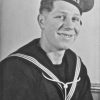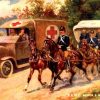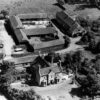9. Public Success and Domestic Sorrow
Crabbe 1807 - 1813
By Kate Pugh
Whatever degree of literary success he achieved in these years, Crabbe’s life in Muston continued largely unchanged. His two surviving sons, now both curates in the Vale of Belvoir, still lived at Muston rectory. As before, Crabbe ‘passed much of his time amongst his choice weeds‘ tending his garden; read aloud to his family in the evening, novels from Mr Colburn’s circulating library; visited the neighbouring clergy and dined with friends like the abolitionist Sir Robert Heron, Sir William Welby, the Lord of the Manor of Allington, and Dr Gordon, Dean of Lincoln and rector of Sedgebrook and East Allington. Crabbe often officiated for his friend Dr Gordon and eventually came to act as his curate, while his own son George became his father’s curate at West Allington. Sometimes he and his sons passed an evening ‘at the assembly room of our metropolis, Grantham‘. Occasionally Crabbe was received at the Castle, ‘where he enjoyed from time to time the opportunity of meeting with many public characters…He was particularly pleased and amused with the conversation of the celebrated Beau Brummel‘ (1)
Sarah Crabbe’s deteriorating health made it difficult for the Crabbes to return hospitality. ‘My mother’s declining state becoming more evident, he was, if possible, more attentive to her comforts than ever. He would take up her meals when in her own room, and sometimes cook her some nicety for supper, when he thought it would otherwise be spoiled. “What a father you have!” was a grateful exclamation often on her lips.‘(2) Naturally, Sarah’s son softens his description of his mother’s condition. Southey was blunter: “It was not long before his wife became deranged … he was … almost confined to his own house, anxiously waiting upon this wife in her long and hopeless malady.” (3)
As well as caring for Sarah, Crabbe continued to act as a doctor as well as a priest to his flock at Muston. He enjoyed rural traditions, such as beating the parish bounds with the local children, who were rewarded with nuts and oranges, but there was no great warmth of feeling between him and his parishioners. They never seem to have forgiven him for his thirteen years absence in Suffolk, while he resented his enforced return and the humiliation of the defections to the Methodists.
Crabbe’s disenchantment with Muston is clear in his correspondence with Scott. Scott imagines him ‘delightfully situated in the Vale of Belvoir, a part of England for which I entertain a special favour for the sake of the gallant hero Robin Hood … under the protection of the Rutland family of whom fame speaks highly.’ Crabbe is quick to disabuse him, ‘with respect to my delightful situation in the Vale of Belvoir and under the very shade of the Castle, I will not say that your imagination has created its beauties, but I must confess it has enlarged and adorned them. The Vale of Belvoir is flat and unwooded and save that an artificial straight-lined piece of water and one or two streams intersect it, there is no other variety than is made by the different crops, wheat, barley, beans’. He goes on to explain that since the death of the forth Duke, he has had much less contact with the Castle and that his dedication of The Borough to the present Duke was received coolly, ‘The Duke also is a very Dukelike man and the Duchess a very excellent lady … but … I am one of the old race’. (4)
Reference
(1) Life p.190
(2) ibid p.192
(3) Robert Southey to Neville White, 30th Sept. 1808, quoted in Ainger p. 74
(4) Letters, Letter to Walter Scott, 29th june 1813
(4)













Comments about this page
I put George Crabbe into the search engine and Kate Pugh’s reference came up top of the list…congratulations. Actually there is very little of substance about Crabbe online and it is very welcome to see such a scholarly approach, especially one that stresses his Bottesford connection, which is less well known than his London, Suffolk and Wilthsire relations. I hope this is regularly updated. Could we not have some critical analysis of some of Crabbe’s writings? I assume Ms Pugh will be publishing her researches in some form. Please keep us literary lovers informed.
Cheers!! Franko
Add a comment about this page